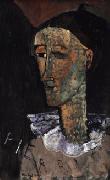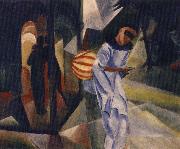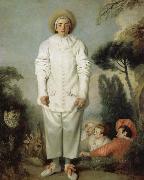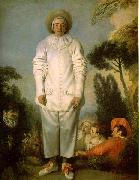Wholesale Oil Painting Reproductions No Minimum and Door to Door! |
|||||||||||
|
|
|||||||||||

|
|||||||||||
|
|
|
||||||||
All Amedeo Modigliani Oil Paintings |
||||||||
|
|
||||||||
|
|
||||||||
|
Artist Introduction: Italian Expressionist Painter and Sculptor, 1884-1920
Amedeo Clemente Modigliani (July 12, 1884 ?C January 24, 1920) was an Italian artist of Jewish heritage, practicing both painting and sculpture, who pursued his career for the most part in France. Modigliani was born in Livorno (historically referred to in English as Leghorn), in northwestern Italy and began his artistic studies in Italy before moving to Paris in 1906. Influenced by the artists in his circle of friends and associates, by a range of genres and art movements, and by primitive art, Modigliani's œuvre was nonetheless unique and idiosyncratic. He died in Paris of tubercular meningitis, exacerbated by poverty, overworking, and an excessive use of alcohol and narcotics, at the age of 35. |
||||||||
|
|
||||||||
|
Pierrot Painting ID:: 10597 |
1915, oil on cardboard, 16 7/8 x 10 5/8 ins (43x27 cm), Statens Museum For Kunst, Copenhagen, Collection J.Rump. |
|||||||
Height Width |
INS/CM Quality |
|||||||
|
X |
| |||||||
|
|
||||||||
All auguste macke Oil Paintings |
||||||||
|
|
||||||||
|
|
||||||||
|
Artist Introduction: August Macke (1887-1914) was a German painter whose harmonious and simple scenes of everyday life made a unique contribution to Expressionism. |
||||||||
|
|
||||||||
|
|
pierrot Painting ID:: 56624 |
mk248 macke var buvudsakligen fauvist i sin fargsattning ocb kubist i sitt form sprak men ban bade annu inte baft tid att assimilera alla influenser ban fatt efter bara sex ar som konstnar. |
||||||
Height Width |
INS/CM Quality |
|||||||
|
X |
| |||||||
|
|
||||||||
All Jean antoine Watteau Oil Paintings |
||||||||
|
|
||||||||
|
|
||||||||
|
Artist Introduction: French Rococo Era Painter, 1684-1721
He is best known for his invention of a new genre, the f?te galante, a small easel painting in which elegant people are depicted in conversation or music-making in a secluded parkland setting (see under F?TE CHAMP?TRE). His particular originality lies in the generally restrained nature of the amorous exchanges of his characters, which are conveyed as much by glance as by gesture, and in his mingling of figures in contemporary dress with others in theatrical costume |
||||||||
|
|
||||||||
|
|
Pierrot Painting ID:: 57268 |
mk255 for in the years 1718-1719. 1.85 x 1.50 meters canvas. Paris, the Louvre |
||||||
Height Width |
INS/CM Quality |
|||||||
|
X |
| |||||||
|
|
||||||||
All WATTEAU, Antoine Oil Paintings |
||||||||
|
|
||||||||
|
|
||||||||
|
Artist Introduction: (1684?C1721).
French painter of Flemish descent, b. Valenciennes. Until 1704 poverty forced him to work in the shops of mediocre artists, where he produced genre and devotional subjects. In 1704?C8 he studied in the studio of Claude Gillot, an adept painter of scenes of theatrical life, which later became the subject of some of Watteau's finest paintings, such as Love in the Italian Theatre and Love in the French Theatre (both: Berlin). In 1708?C9 Watteau worked with the decorator Claude Audran. Watteau attracted the attention of eminent patrons in his last years, including the comte de Caylus, his biographer, and in 1717 he was made a full member of the Acad??mie royale. The Embarkation for Cythera (1717; Louvre) is characteristic of his art; it is a delicate, courtly fantasy, represented in warm and shimmering pastel tones that place him among the great colorists of all time. A lyric, Giorgionesque quality pervades his airy, gay, and sensuous scenes, which have a poignancy that none of his followers attained. Out of the most fleeting aspects of life he created an enduring and individual art. His exquisite paintings influenced fashion and garden design in the 18th cent. Other outstanding works include Gilles (Louvre), Perspective (Mus. of Fine Arts, Boston), Mezzetin (Metropolitan Mus.), and Gersaint's Shop Sign (1719; Berlin). |
||||||||
|
|
||||||||
|
|
Pierrot Painting ID:: 80110 |
Oil on canvas
Dimensions 184 x 149 cm (72.4 x 58.7 in)
cyf |
||||||
Height Width |
INS/CM Quality |
|||||||
|
X |
| |||||||
|
|
||||||||
|
Prev Next
|
||||||||
|
|
||||||||
|
Related Paintings to WATTEAU, Antoine :. |
||||||||
|
|
||||||||
|
CONTACT US |




